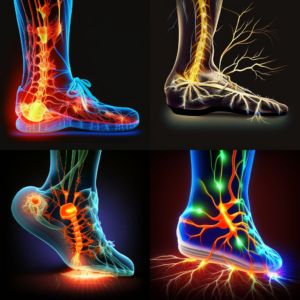Vitamin Deficiencies and Neuropathy: How to Prevent and Treat
Neuropathy is a condition characterized by damage or dysfunction of the peripheral nerves, leading to symptoms such as numbness, tingling, and pain in the extremities. While various factors can contribute to neuropathy, including diabetes, trauma, and infections, one often overlooked aspect is the role of vitamin deficiencies. Essential vitamins play a crucial role in maintaining the health of our nerves, and deficiencies can contribute to the development or exacerbation of neuropathy symptoms. In this comprehensive guide, we will explore the connection between vitamin deficiencies and neuropathy, and provide insights into how to prevent and treat them effectively.

Understanding the Link:
Vitamins, such as B12, B6, and E, are essential for nerve health and function. Deficiencies in these vitamins can lead to nerve damage and contribute to neuropathy symptoms. Let’s take a closer look at the role of these key vitamins in nerve health:
Vitamin B12:
Vitamin B12, also known as cobalamin, is vital for forming myelin, a protective covering around nerves. Myelin helps in the proper conduction of nerve signals. Without adequate levels of B12, nerve damage can occur, leading to neuropathy symptoms. Vegans, vegetarians, and individuals with digestive disorders, such as celiac disease, are at a higher risk of B12 deficiency. Including B12-rich foods like fish, poultry, eggs, and dairy products in your diet, or taking B12 supplements, can help prevent B12 deficiency and reduce the risk of neuropathy.
Vitamin B6:
Vitamin B6, also known as pyridoxine, is involved in the synthesis of neurotransmitters and is crucial for maintaining the health of nerve fibers. Deficiency in this vitamin can lead to neuropathy symptoms, including numbness and tingling. Good dietary sources of vitamin B6 include bananas, poultry, fish, whole grains, and nuts. However, excessive intake of B6 through supplements should be avoided as it can adversely affect nerve health.
Vitamin E:
Vitamin E is an antioxidant that protects nerves from damage caused by free radicals. It plays a vital role in maintaining the integrity of cell membranes and nerve fibers. Deficiency in vitamin E can contribute to nerve degeneration and worsen neuropathy symptoms. Including foods like almonds, spinach, avocados, and sunflower seeds in your diet can help maintain adequate levels of vitamin E.
Preventing Vitamin Deficiencies:
Preventing vitamin deficiencies is crucial for maintaining nerve health and preventing neuropathy. Here are some effective strategies to consider:
Balanced Diet:
A well-balanced diet rich in fruits, vegetables, whole grains, lean proteins, and healthy fats provides essential vitamins and minerals necessary for nerve health. Include a variety of vitamin-rich foods in your meals to ensure you’re getting an adequate intake of all the necessary vitamins.
Regular Blood Tests:
Regular blood tests can help identify any underlying vitamin deficiencies. If you’re experiencing neuropathy symptoms or have risk factors for deficiency, consult your healthcare provider to discuss the possibility of getting tested. Early detection and treatment of deficiencies can help prevent or manage neuropathy effectively.

Supplementation:
In some cases, dietary modifications may not be sufficient to address vitamin deficiencies. Your healthcare provider may recommend supplements to restore vitamin levels. However, it’s crucial to consult a healthcare professional before starting any supplements to ensure appropriate dosage and prevent potential interactions with other medications.
Treating Vitamin Deficiencies and Neuropathy:
If you’ve been diagnosed with a vitamin deficiency or are experiencing neuropathy symptoms, the following treatment options can be considered:
Medications:
Depending on the severity of neuropathy symptoms and underlying causes, your healthcare provider may prescribe medications to manage pain and improve nerve function. Medications such as analgesics, antidepressants, and anticonvulsants may be used as part of the treatment plan. These medications help to alleviate neuropathic pain, reduce inflammation, and regulate the transmission of nerve signals.
Physical Therapy:
Physical therapy can play a significant role in managing neuropathy symptoms and improving nerve function. A skilled physical therapist can design a customized exercise program to strengthen muscles, improve balance and coordination, and promote better nerve health. They may also incorporate massage, stretching, and electrical stimulation to relieve pain and enhance nerve function.
Lifestyle Modifications:
In addition to addressing vitamin deficiencies, certain lifestyle modifications can help manage neuropathy symptoms. These include:
Quitting smoking: Smoking restricts blood flow, which can further damage nerves. Quitting smoking can improve overall circulation and support nerve health.
Managing blood sugar levels: If diabetes is the underlying cause of neuropathy, it’s essential to keep blood sugar levels under control. This can be achieved through a combination of medication, diet, exercise, and regular monitoring.
Protecting your feet and hands: Numbness associated with neuropathy can increase the risk of injuries. Taking precautions such as wearing protective footwear, checking for cuts or blisters, and avoiding extreme temperatures can help prevent complications.
Stress management: Chronic stress can exacerbate neuropathy symptoms. Practicing relaxation techniques such as meditation, deep breathing exercises, and engaging in activities that promote relaxation can help manage stress levels and improve overall well-being.
Alternative Therapies:
Certain alternative therapies may provide relief for neuropathy symptoms. These include acupuncture, transcutaneous electrical nerve stimulation (TENS), and herbal remedies. While more research is needed to establish their effectiveness, some individuals find these therapies beneficial in managing pain and improving nerve function. It’s essential to consult with a qualified practitioner and inform your healthcare provider before trying any alternative therapies.
 Conclusion:
Conclusion:
Vitamin deficiencies can significantly impact nerve health and contribute to developing or worsening neuropathy symptoms. By understanding the role of essential vitamins like B12, B6, and E, and taking steps to prevent deficiencies through a balanced diet, regular blood tests, and appropriate supplementation, you can support optimal nerve function and reduce the risk of neuropathy. Additionally, if you’re experiencing neuropathy symptoms, seeking medical advice for an accurate diagnosis and a comprehensive treatment plan is crucial. With the right approach, including medications, physical therapy, lifestyle modifications, and potentially alternative therapies, it’s possible to manage neuropathy effectively and improve your quality of life.
Disclaimer: This blog post is intended for informational purposes only and should not be considered a substitute for professional medical advice. Always consult with a qualified healthcare provider regarding any health concerns or treatment options.


 Conclusion:
Conclusion: